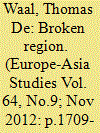| Srl | Item |
| 1 |
ID:
116312


|
|
|
|
|
| Publication |
2012.
|
| Summary/Abstract |
This essay reviews failed historical attempts at regional integration in the South Caucasus since the early twentieth century, and in particular the failed Transcaucasian federations of 1918 and 1922-1936 and the breakdown of Soviet economic integration in the region. It argues that there is much that makes the South Caucasus a viable region in terms of geography, culture and economic potential, but political contradictions and persistent perceptions of insecurity make for a pattern of recurring fragmentation. Both Caucasians and outsiders have a role to play if voluntary integration is to work as a project in the future.
|
|
|
|
|
|
|
|
|
|
|
|
|
|
|
|
| 2 |
ID:
046763


|
|
|
|
|
| Publication |
New York, New York University Press, 1998.
|
| Description |
xiv, 416p.: ill.pbk
|
| Standard Number |
0814731325
|
|
|
|
|
|
|
|
|
|
|
|
Copies: C:1/I:0,R:0,Q:0
Circulation
| Accession# | Call# | Current Location | Status | Policy | Location |
| 045588 | 947.52/GAL 045588 | Main | On Shelf | General | |
|
|
|
|
| 3 |
ID:
136509


|
|
|
|
|
| Summary/Abstract |
A century on, discussions about the Ottoman massacre of Armenians are still dominated by questions surrounding the use of one fraught and divisive word: “Genocide.” Washington should use the term but also recognize its many limitations. One hundred years ago this April, the Ottoman Empire began a brutal campaign of deporting and destroying its ethnic Armenian community, whom it accused of supporting Russia, a World War I enemy. More than a million Armenians died. As it commemorates the tragedy, the U.S. government, for its part, still finds itself wriggling on the nail on which it has hung for three decades: Should it use the term “genocide” to describe the Ottoman Empire’s actions toward the Armenians, or should it heed the warnings of its ally, Turkey, which vehemently opposes using the term and has threatened to recall its ambassador or even deny U.S. access to its military bases if the word is applied in this way? The first course of action would fulfill the wishes of the one-million-strong Armenian American community, as well as many historians, who argue that Washington has a moral imperative to use the term. The second would satisfy the strategists and officials who contend that the history is complicated and advise against antagonizing Turkey, a loyal strategic partner.
|
|
|
|
|
|
|
|
|
|
|
|
|
|
|
|
| 4 |
ID:
065680


|
|
|